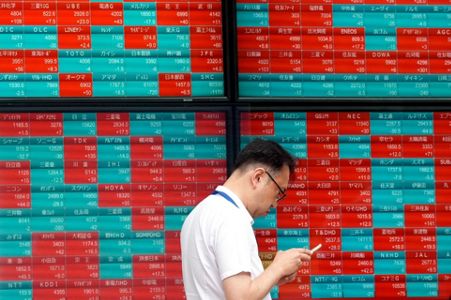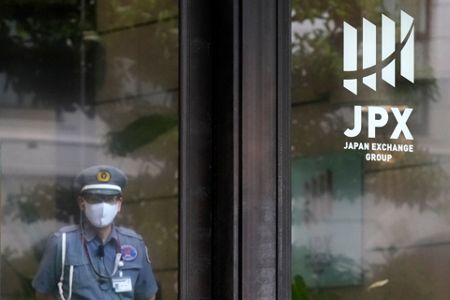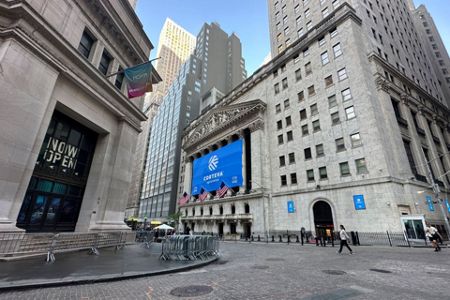TOKYO (AP) — Asian shares traded mixed Wednesday, as investors weighed recent data highlighting a slowing U.S. economy that offers both upsides and downsides for Wall Street.
Japan's benchmark Nikkei 225 shed 1.0% in early trading to 38,448.61. Australia's S&P/ASX 200 edged up 0.3% to 7,759.20. South Korea's Kospi jumped 1.2% to 2,695.02. Hong Kong's Hang Seng added 1.2% to 18,659.24, while the Shanghai Composite dipped nearly 0.1% to 3,088.18.
Analysts said recent data on wage growth in Japan will turn more pronounced once results of the recent spring labor negotiations kick in. That means the Bank of Japan may be more likely to raise interests rates.
On Tuesday, the S&P 500 ticked up by 0.2% to 5,291.34, though more stocks within the index fell than rose. The Dow Jones Industrial Average rose 0.4% to 38,711.29, and the Nasdaq composite added 0.2% to 16,857.05.
Action was stronger in the bond market, where Treasury yields slid after a report showed U.S. employers were advertising fewer job openings at the end of April than economists expected.
Wall Street actually wants the job market and overall economy to slow enough to get inflation under control and convince the Federal Reserve to cut interest rates. That would ease pressure on financial markets. Traders upped their expectations for cuts to rates later this year following the report, according to data from CME Group.
The risk is that the economy might overshoot and end up in a painful recession that would cause layoffs for workers across the country and weaken corporate profits, dragging stock prices lower.
Tuesday’s report said the number of U.S. job openings at the end of April dropped to the lowest level since 2021. The numbers suggest a return to “a normal job market” following years full of strange numbers caused by the COVID-19 pandemic, according to Bill Adams, chief economist for Comerica Bank.
But it also followed a report on Monday that showed U.S. manufacturing contracted in May for the 18th time in 19 months. Worries about a slowing economy have hit the price of crude oil in particular this week, raising the possibility of less growth in demand for fuel.
A barrel of U.S. crude has dropped close to 5% in price this week and is roughly back to where it was four months ago. That sent oil-and-gas stocks to some of the market’s worst losses for a second straight day. Halliburton dropped 2.5%.
Early Wednesday, benchmark U.S. crude lost 2 cents to $73.23 a barrel. Brent crude, the international standard, added 3 cents to $77.55 a barrel.
Companies whose profits tend to rise and fall with the cycle of the economy also fell to sharp losses, including steel makers and mining companies. Copper and gold miner Freeport-McMoRan lost 4.5%, and steelmaker Nucor fell 3.4%.
The smaller companies in the Russell 2000 index, which tend to thrive most when the U.S. economy is at its best, fell 1.2%.
Elsewhere on Wall Street, Bath & Body Works tumbled 12.8% for the worst loss in the S&P 500 despite topping expectations for revenue and profit in the latest quarter.
GameStop also gave back some of its big gain from the day before, when euphoria broke out after a central character in the stock’s 2021 run returned to say he had built a stake in the video-game retailer. It dropped 5.4%.
On the winning side of Wall Street were dividend-paying stocks. They tend to benefit from lower interest rates because bonds paying lower yields can steer more income-seeking investors to real-estate investment trusts, utilities and other stocks that pay relatively high dividends.
Camden Property Trust, which offers multifamily housing around the country, rose 2.6% for one of the largest gains in the S&P 500. Mid-America Apartment Communities rose 2.1%.
Some Big Tech stocks whose fortunes seem to continue to rise no matter what the economy is doing also drove the market higher. Nvidia was the strongest force pushing the S&P 500 upward. It rose 1.2% as it keeps riding a furor on Wall Street around artificial-intelligence technology.
Also Wednesday, the U.S. dollar rose to 155.38 Japanese yen from 154.84 yen. The euro cost $1.0884, little changed from $1.0883.
___
AP Business Writer Stan Choe contributed.
Copyright 2024 The Associated Press. All rights reserved. This material may not be published, broadcast, rewritten or redistributed without permission.






